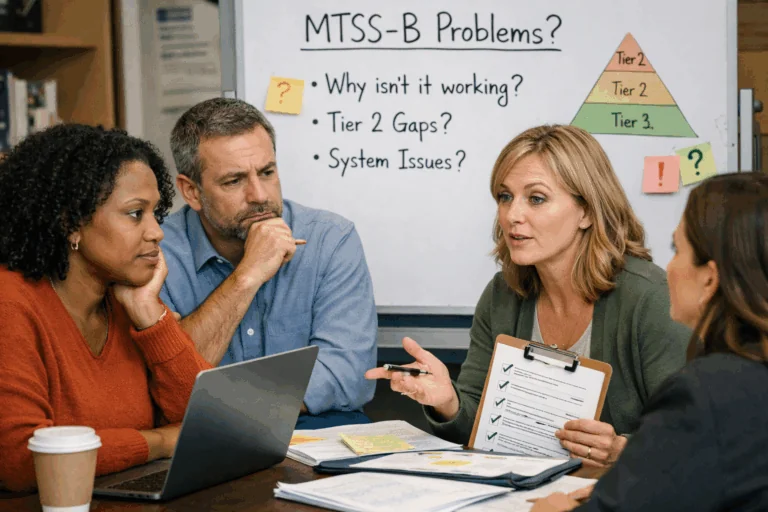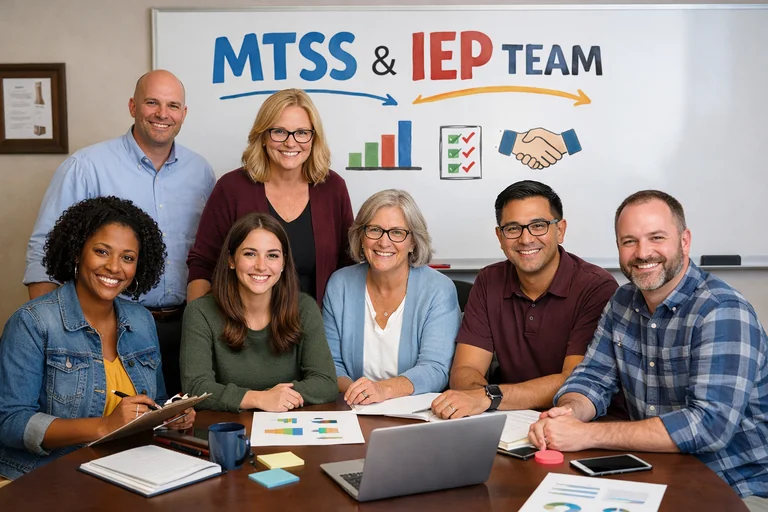A Behavior Intervention Plan (BIP) is a structured guide designed to promote positive behavior change by identifying problem behaviors, implementing prevention strategies, teaching alternatives, and outlining effective responses. BIPs are most effective when developed collaboratively and implemented consistently.
To create an effective plan, it is essential to consider the context and function of a student’s challenging behavior. Understanding behavior patterns and influencing factors allows for meaningful adjustments to the classroom environment and instructional methods. These adaptations help students meet their needs in a more socially appropriate manner while fostering a safe and structured learning environment.
In each of these Behavior Intervention Plan Examples, school teams collaborated to “think functionally” about student behavior, developing practical, individualized, and function-based supports using existing information—without requiring a more intensive Functional Behavior Assessment (FBA).
However, if these plans prove ineffective, if the understanding of behavioral function and contextual variables becomes less clear, or if target behaviors escalate to persistent and unsafe levels, the school teams will consider conducting an FBA to develop more comprehensive behavior supports.
Example BIP 1: Defiance Elementary General Education – Tier 2
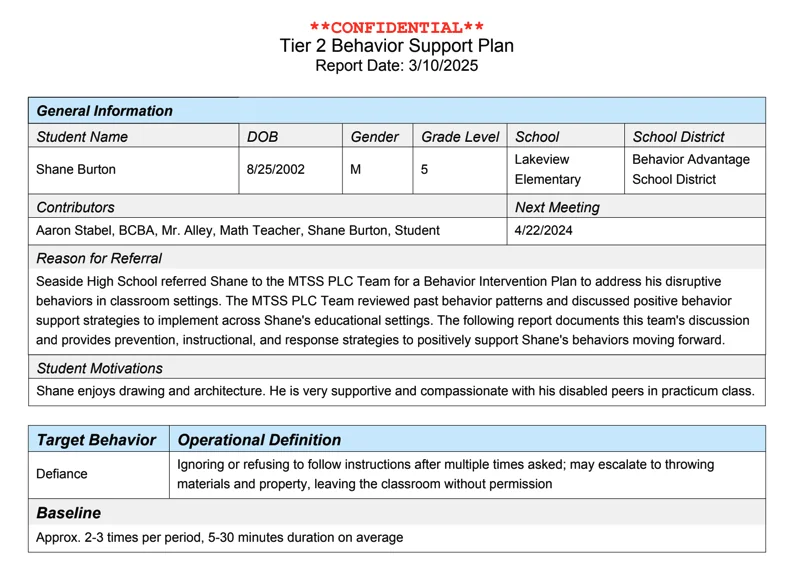
Download Behavior Plan Example
This Tier 2 behavior support plan was developed collaboratively by the Lakeview Elementary MTSS team and the classroom teacher to address the needs of a 5th-grade general education student. The plan is both practical for the classroom setting and tailored to support the student’s current behavior.
Proactive and instructional strategies focus on relationship-building and pre-teaching methods to promote compliance and participation. Additionally, the plan reinforces appropriate replacement behaviors, such as taking space or using the calming corner when escalated. Effective response strategies are also outlined to support de-escalation and ensure a constructive approach to behavior management.
If you want to learn more about BIPs, see our complete guide, including more practical examples and tips. You can also check out our blog on Teaching Replacement Behaviors in BIP.
Example BIP 2: Disrespectful Behavior Middle/Secondary General Education/Inclusion
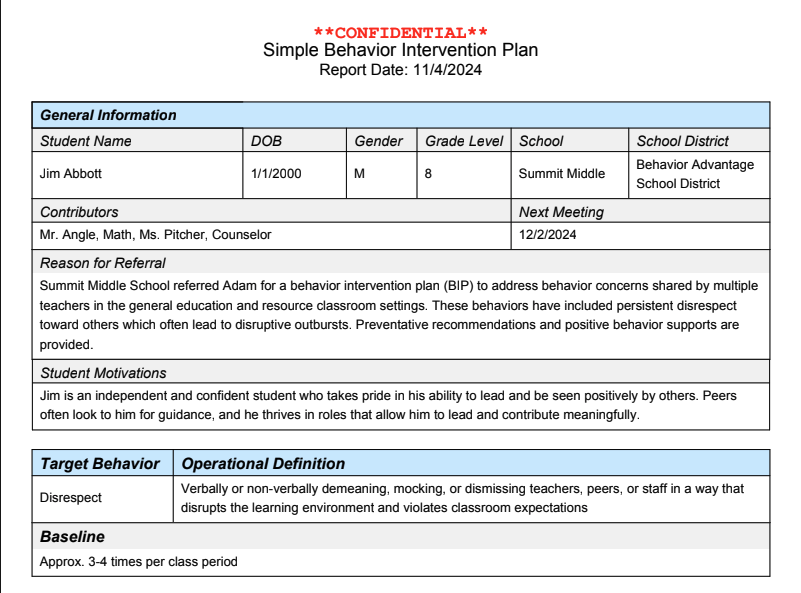
Download Behavior Plan Example
Let’s consider another Behavior Intervention Plan example. Math teacher and Case Manager, Mr. Angle, initiated a team meeting to address concerns about Jim’s persistent disrespect toward others and to develop a consistent, unified approach for prevention and response.
Jim’s input was considered throughout the planning process, and he was given opportunities to provide feedback and request specific support or teacher language that would be most helpful to him.
The team outlined preventative strategies and positive behavior supports, including daily leadership opportunities, structured support for obtaining attention through appropriate behavior, a Behavior Contract with a reinforcement system, and consistent strategies for response and redirection.
Writing a BIP might seem daunting at first. Learn more about how to write an effective BIP in one of our latest blogposts.
Example BIP 3:Disruptive Behavior Pre-K/Kindergarten
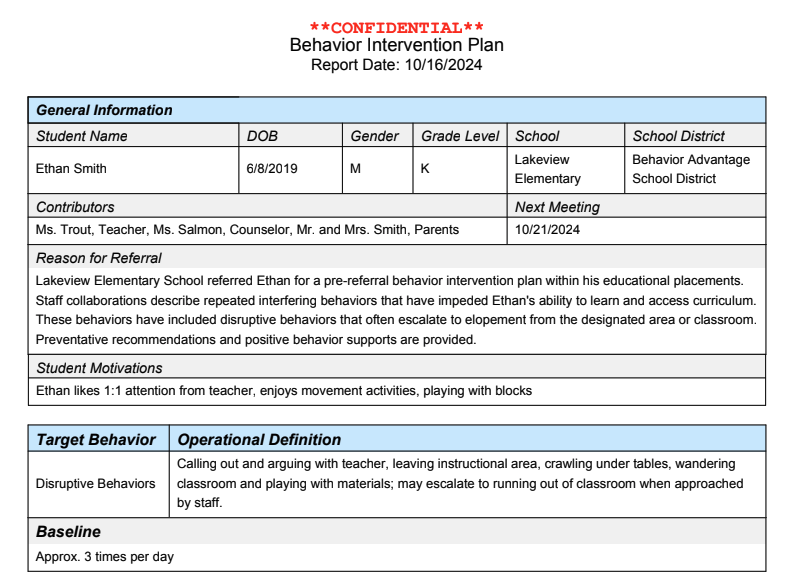
Download Behavior Plan Example
Lakeview Elementary School’s Pre-K team referred Ethan for a pre-referral behavior intervention plan to address behaviors impacting his ability to learn and access the curriculum. Staff collaboration indicates repeated disruptive behaviors, often escalating to elopement from the designated area or classroom.
To support Ethan, preventative strategies and positive behavior interventions have been developed, building upon the program’s structured instructional setting. These include additional support for teaching and modeling appropriate classroom behavior to promote engagement and success.
There are many other Behavior Intervention Plan examples that you can explore to improve your understanding of the topic. If you have done your research and are ready to begin writing, use Behavior Advantage’s free BIP PDF Template to help structure your plan.
If you’re looking for a complete solution to ensuring effective behavior planning in your school or district – get in touch today!




